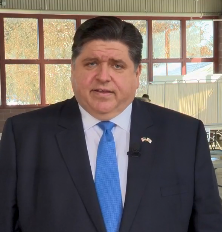
Blue Collar Jobs Act was approved on bipartisan lines in 2019 before governor froze it amid pandemic
By JERRY NOWICKI
Capitol News Illinois
jnowicki@capitolnewsillinois.com
SPRINGFIELD – As budget negotiations for the coming fiscal year continued behind closed doors Wednesday, Gov. JB Pritzker’s office announced it would launch a long-stalled tax incentive program that was part of his first-year budget.
The program – known as the Blue Collar Jobs Act– was a bargaining chip for Republican votes in 2019 for both a massive infrastructure plan and the state budget – the only annual spending plan to land on Pritzker’s desk with bipartisan support from lawmakers. The measure would offer business tax credits for wages paid on certain construction projects.
But in early 2021, with the state staring down an anticipated budget deficit amid the COVID-19 pandemic, Pritzker unilaterally delayed implementation of the program, angering the GOP members who had pushed for it.
The state’s fiscal outlook has since rebounded, leading to unforeseen revenue spikes as federal stimulus funds circulated through the economy in fiscal years 2022 and 2023. With the governor’s office currently anticipating about $50.4 billion in revenue for the upcoming Fiscal Year 2024, his office on Wednesday announced that it had finally opened the Blue Collar Jobs Act application window.
“Today, I am proud to announce yet another investment in our communities — the Blue Collar Jobs Act Tax Credit — to promote construction projects in underserved areas, while creating more good-paying jobs up and down the state,” Pritzker announced in a news release.
Republicans chalked the announcement up as a win, even as some in the minority party lamented that the details of the upcoming budget remained unknown just two days ahead of Friday’s scheduled adjournment of the spring legislative session.
“We have consistently requested that the governor implement the long-stalled Blue Collar Jobs Act that was a part of the 2019 Rebuild Illinois bipartisan agreement,” Senate Minority Leader John Curran, R-Downers Grove, said in a statement.
He hailed implementation of the act as “a step in the right direction for rebuilding our economy and providing more job opportunities to Illinois workers.”
The program offers tax breaks of up to $20 million per year to eligible companies. The tax credit would offset wages paid to construction workers, up to 75 percent in “underserved areas” as determined by the Department of Commerce and Economic Opportunity, and 50 percent elsewhere.
Projects exceeding $10 million in construction costs are eligible if the construction is located in enterprise zones as defined by state law or if the business has a contract under the state’s Economic Development for a Growing Economy program.
Companies designated “high impact businesses” under state law would be eligible for credits if the project exceeds $12 million and creates 500 full-time jobs, or if it exceeds $30 million and leads to the retention of 1,500 full-time jobs.
Projects in a River Edge Redevelopment Zone as defined in state law would be eligible if they have a qualified rehabilitation plan exceeding $1 million.
The grants would be available for businesses that completed projects in 2021 or later, honoring the original effective date of the bipartisan agreement.
Pritzker’s announcement came just two days before lawmakers were scheduled to adjourn their spring legislative session. That deadline, however, was self-imposed; lawmakers could extend session through May 31 without triggering the constitutional requirement that a three-fifths majority is needed to pass a bill with an immediate effective date.
The major unfinished item as of Wednesday nightwas the state’s operating budget. No bill language had been filed and neither chamber moved an appropriations bill that could contain the budget plan. That meant session is likely to continue past Friday’s scheduled adjournment date, due to the state constitution’s requirement that bills be read three times on the floor before passage.
Capitol News Illinois is a nonprofit, nonpartisan news service covering state government. It is distributed to hundreds of print and broadcast outlets statewide. It is funded primarily by the Illinois Press Foundation and the Robert R. McCormick Foundation, along with major contributions from the Illinois Broadcasters Foundation and Southern Illinois Editorial Association.


